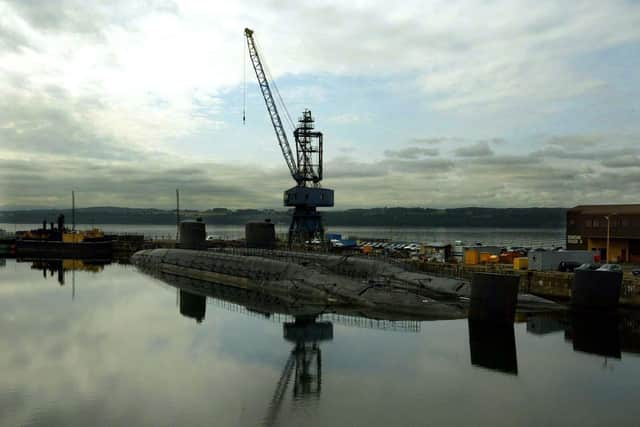Scotland's nuclear military bases at 'very great' risk of flooding due to climate change, report finds
and live on Freeview channel 276
Findings suggest the Royal Navy’s Faslane base on the Clyde may have to be closed down due to the high risk of inundation in coming years and the dangers that could present.
The Trident missile store at Coulport, also on the Clyde, and nuclear submarine scrapyard at Rosyth, on the Forth, are also likely to be affected by flooding due to a combination of rising sea level, higher rainfall and frequent storm surges, the analysis found.
Six further nuclear sites in England are also under threat.


And the bases are likely to be hit “sooner than expected”.
Advertisement
Hide AdAdvertisement
Hide AdThe report, by Dr Paul Dorfman, a former Ministry of Defence (MoD) advisor and chair of the Nuclear Consulting Group think-tank, concludes “near-term climate change risk to nuclear is very great” and “UK nuclear military installations are on the front-line of climate change”.
The document states: “Present UK coastal military nuclear infrastructure is profoundly vulnerable to flooding from sea level rise, storm intensity and storm surge, with inland nuclear facilities also facing inundation and flooding.”
It warns there is also “significant risk” to stockpiles of military radioactive waste from “climate-drive extreme weather”.
The report points out that previous predictions have under-estimated the magnitude and pace of changes caused by rising world temperatures and claims government safety regulators have been “relatively complacent” about the threats in the past.
Advertisement
Hide AdAdvertisement
Hide AdDr Dorfman suggests “there exists the very real likelihood that global heating-driven climate impacts on the UK nuclear military enterprise are not being adequately costed, prioritised or regulated”.
It states: “Put simply, sea-level rise is significantly faster than previously thought.
“Meanwhile, predicted changes to storm patterns affecting both storm surge and river flow will produce combined hazards, making current flood mitigation efforts increasingly obsolete.”
The report includes a series of maps illustrating the scale of flood risks to military nuclear facilities, based on “conservative” and “median” estimates of sea level rises – which are forecast to reach up to 2.5m.
Advertisement
Hide AdAdvertisement
Hide AdThe MoD denies it has been complacent, while the UK Government’s Office for Nuclear Regulation (ONR) maintains that flood protection at nuclear sites is “very high” and risks to safety “very low”.
As well as the three nuclear sites in Scotland, the BAE Systems yard at Barrow; Sellafield nuclear complex in Cumbria; nuclear weapons plants at Aldermaston and Burghfield in Berkshire, Devonport naval base in Plymouth and the Rolls Royce submarine plant at Raynesway in Derby are also at risk.
To sum up, the report says: “Present UK coastal military nuclear infrastructure is deeply vulnerable to flooding from sea-level rise, storm intensity and storm surge, with inland nuclear facilities facing inundation and flooding.
“Ministry of Defence and nuclear regulatory climate impact mitigation efforts will become increasingly obsolete, and sooner than currently planned.
Advertisement
Hide AdAdvertisement
Hide Ad“Climate impact to nuclear will inevitably involve very significant expense for UK nuclear military installation operation, waste management, decommissioning, relocation or abandonment.
“In other words, UK nuclear military bases are set to flood.”
Dr Dorfman, who founded the Nuclear Consulting Group, is an honorary senior research associate at University College London.
A message from the Editor:
Thank you for reading this article. We’re more reliant on your support than ever as the shift in consumer habits brought about by coronavirus impacts our advertisers.
If you haven’t already, please consider supporting our trusted, fact-checked journalism by taking out a digital subscription.
Comment Guidelines
National World encourages reader discussion on our stories. User feedback, insights and back-and-forth exchanges add a rich layer of context to reporting. Please review our Community Guidelines before commenting.
